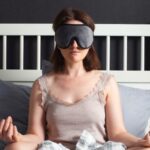Feeling restless before bedtime can easily disrupt your sleep and make you toss and turn all night. In “7 Ways to Calm Your Mind Before Bed,” you’ll discover practical and gentle techniques to help ease your mind and prepare you for a restful night’s sleep. From simple breathing exercises to soothing nighttime rituals, this guide offers seven effective methods to help you unwind, reduce anxiety, and peacefully drift off into dreamland. Say goodbye to sleepless nights and hello to a more refreshed and energized you. Have you ever found yourself lying in bed, staring at the ceiling, unable to turn off the endless stream of thoughts racing through your mind? If this sounds all too familiar, you're not alone. In today's fast-paced world, many people struggle to calm their minds before bed. The good news is that there are effective ways to achieve that much-needed peace and relaxation.
In this article, we’ll explore “7 Ways to Calm Your Mind Before Bed” to help you achieve a restful night's sleep. So, let's dive in and discover these soothing techniques that could transform your nights.
1. Establish a Bedtime Routine
Creating a consistent bedtime routine can signal to your brain that it's time to wind down. Just as children benefit from a predictable nightly ritual, adults can also find comfort and relaxation in a structured evening routine.
Why a Bedtime Routine Works
Bedtime routines work by setting up a series of habits that tell your body it's time to sleep. Over time, these cues become ingrained, making it easier for your mind to settle.
Steps to Create Your Routine
- Set a Consistent Bedtime
Choose a bedtime and stick to it every night, even on weekends. This helps regulate your internal clock. - Wind Down Activities
Include relaxing activities in your routine. Consider reading a book, taking a warm bath, or practicing gentle stretches. - Avoid Screens
Try to disconnect from electronic devices at least an hour before bed. The blue light emitted from screens can interfere with your ability to fall asleep. - Create a Relaxing Environment
Lower the lights in your bedroom, play soft music, or use aromatherapy to create a calming atmosphere.
| Step | Description |
|---|---|
| 1. Set a Consistent Bedtime | Choose and stick to a regular bedtime. |
| 2. Wind Down Activities | Engage in calm activities like reading or stretching. |
| 3. Avoid Screens | Disconnect from electronic devices at least an hour before bed. |
| 4. Create a Relaxing Env. | Lower lights, play soft music, or use aromatherapy. |
2. Practice Mindfulness and Meditation
Mindfulness and meditation are powerful tools to calm the mind. These practices focus on grounding yourself in the present moment, reducing anxiety, and promoting relaxation.
How Mindfulness Helps Sleep
Mindfulness techniques, such as focused breathing and body scans, can help you break the cycle of anxious thoughts that often prevent sleep.
Simple Mindfulness Exercises
- Deep Breathing
Sit or lie down comfortably. Take a deep breath in for four counts, hold for four counts, and then exhale for four counts. Repeat this several times. - Body Scan
Lie on your back and close your eyes. Slowly focus your attention on each part of your body, starting from your toes and moving up to your head. Notice any tension and consciously release it.
Guided Meditation Apps
If you're new to meditation, guided meditation apps can be incredibly helpful. Apps like Calm, Headspace, and Insight Timer offer sessions specifically designed to help you sleep.
| Exercise | Description |
|---|---|
| Deep Breathing | Inhale for four counts, hold for four, exhale for four. Repeat several times. |
| Body Scan | Focus on each body part, release tension methodically. |
| Use Apps | Apps like Calm and Headspace provide guided sessions to aid sleep. |
3. Limit Caffeine and Alcohol Intake
What you consume can significantly impact your sleep quality. Both caffeine and alcohol can disrupt your ability to fall and stay asleep.
Effects of Caffeine on Sleep
Caffeine is a stimulant that can keep your mind alert long after you've consumed it. Avoiding it well before bedtime is crucial.
Alcohol and Sleep Disruption
While alcohol might initially make you feel sleepy, it can disrupt your sleep cycle, causing intermittent wakefulness and poorer sleep quality.
Tips for Managing Intake
- Know Your Limits
Understand how much caffeine and alcohol your body can handle. Everyone's tolerance is different. - Timing Matters
Avoid caffeine after mid-afternoon and limit alcohol intake in the evenings. - Healthy Alternatives
Opt for herbal teas like chamomile or peppermint, which promote relaxation without the side effects.
| Beverage | Impact on Sleep | Tips |
|---|---|---|
| Caffeine | Can keep mind alert | Avoid after mid-afternoon |
| Alcohol | Causes sleep disruption | Limit intake in the evenings |
| Herbal Teas | Promote relaxation | Opt for chamomile or peppermint tea |
4. Engage in Regular Physical Activity
Exercise is not only good for your body but also for your mind. Regular physical activity can reduce anxiety, elevate mood, and improve sleep quality.
Why Exercise Helps
Physical activity encourages the production of endorphins, which are natural mood lifters. It also tires your body out, making it easier to fall asleep at night.
Best Time to Exercise
While exercise is beneficial, the timing can affect your sleep. Aim to complete strenuous workouts at least a few hours before bedtime to allow your body time to wind down.
Types of Physical Activity
- Aerobic Exercise
Activities like running, swimming, or cycling can significantly improve sleep quality. - Strength Training
Lifting weights or doing bodyweight exercises can also contribute to better sleep. - Light Activity
Even light activities like walking or yoga can be beneficial, especially if done in the evening.
| Activity Type | Benefits | Best Time to Perform |
|---|---|---|
| Aerobic Exercise | Improves sleep quality | Complete a few hours before bed |
| Strength Training | Contributes to better sleep | Avoid intensive sessions close to bedtime |
| Light Activity | Beneficial for relaxation | Can be done in the evening |
5. Use Relaxation Techniques
Alongside mindfulness, other relaxation techniques can be incredibly effective in helping you wind down before bed. These methods focus on reducing physical tension and calming the mind.
Progressive Muscle Relaxation (PMR)
PMR is a technique where you tense and then slowly release each muscle group in your body. This practice helps reduce physical tension and promote relaxation.
Visualization
Visualization involves imagining a peaceful scene or scenario. This technique can help divert your mind from stress and promote a sense of calm.
Aromatherapy
Using essential oils like lavender, chamomile, or sandalwood can relax your mind and body. You can diffuse these oils in your room or apply them to your skin (diluted in a carrier oil).
| Technique | Description |
|---|---|
| Progressive Muscle | Tense and release each muscle group to reduce tension. |
| Relaxation (PMR) | |
| Visualization | Imagine a peaceful scene to divert your mind from stress. |
| Aromatherapy | Use essential oils like lavender or chamomile for relaxation. |
6. Maintain a Sleep-Inducing Environment
Your bedroom environment plays a crucial role in how well you sleep. Creating a sleep-conducive atmosphere can make it easier for you to fall and stay asleep.
Ideal Room Temperature
A cooler room temperature is generally more conducive to sleep. Aim for a temperature between 60-67°F (15-19°C).
Minimize Noise and Light
Reducing noise and light pollution in your bedroom can make a significant difference. Consider using blackout curtains, white noise machines, or earplugs.
Comfortable Bedding
Invest in a good-quality mattress, pillows, and linens. Your comfort is paramount to achieving restful sleep.
| Factor | Ideal Condition |
|---|---|
| Room Temperature | 60-67°F (15-19°C) |
| Noise and Light | Use blackout curtains, white noise machines, or earplugs to minimize. |
| Bedding | Invest in a quality mattress, pillows, and linens. |
7. Limit Exposure to Stressful Activities
The activities you engage in before bed can directly impact your ability to fall asleep. Avoiding stressful tasks and thoughts during the evening can help you wind down more effectively.
Why Stressful Activities Affect Sleep
Stress triggers the release of cortisol, a hormone that can keep you awake and alert. Engaging in calming activities instead can help reduce this stress response.
Activities to Avoid
- Work-Related Tasks
Try to finish work tasks well before bedtime to give your mind a chance to relax. - Intense Conversations
Emotional or intense conversations can spike anxiety. Save these discussions for a more appropriate time. - Stimulating Media
Avoid watching exciting or scary movies or engaging in stimulating video games close to bedtime.
Activities to Consider
- Calm Hobbies
Engage in activities like knitting, drawing, or puzzles, which can help distract and relax your mind. - Soothing Music
Listening to calming music or ambient sounds can be a great way to unwind. - Light Reading
Opt for light, positive reading material before bed.
| Stressful Activities to Avoid | Alternatives for Relaxation |
|---|---|
| Work-Related Tasks | Calm Hobbies like knitting or drawing |
| Intense Conversations | Listening to soothing music |
| Stimulating Media | Light, positive reading material |
Conclusion
Calming your mind before bed is essential for a good night's sleep and overall well-being. By establishing a bedtime routine, practicing mindfulness, managing your intake of caffeine and alcohol, engaging in physical activity, using relaxation techniques, maintaining a sleep-inducing environment, and limiting exposure to stressful activities, you can create a more peaceful end to your day.
Give these strategies a try and discover which combination works best for you. Here's to calmer nights and sweeter dreams!









